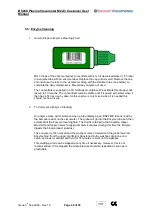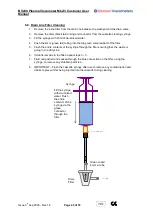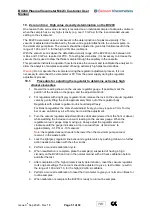
BV200 Plasma Viscometer Mk2/3 Customer User
Manual
Issue 9
th
Sep 2020 - Rev 1.8
Page 53 of 53
* If a patient has recently had a high volume of intravenous fluid administered this may alter
the patients viscosity result. For example, some plasma expanders may give erroneous low
values, whilst some parenteral fluids may give erroneous high values.
11.4.
Physiological Factors Influencing Plasma Viscosity
Age (after 3 years), gender, and diurnal rhythms have no effect on PV. Throughout life serial
PV measurements in a healthy individual vary as little as 0.05 mPa.s. The only physiological
factor that has a significant and consistent effect on PV is pregnancy. PV remains normal in
the first two trimesters and gradually rises to around 1.80 mPa.s in the final trimester.
Therefore,
small variations in an individual‟s PV may be clinically significant.
11.5.
Plasma Viscosity in Disease
Acute phase response
1.
As a result of the acute phase response many plasma proteins including fibrinogen and
immunoglobulins are increased and this is reflected as a rise in PV. This response occurs
within 24 hours.
Chronic inflammatory diseases
2.
PV cannot diagnose any condition; however, when taken in conjunction with a clinical
assessment a result in the range of 1.75
– 2.00 mPa.s can give an indication of an underlying
problem.
Malignant disease
3.
Early stage malignancy may be associated with a normal PV. With more advanced disease
there is often a moderate rise in PV.
Paraproteinaemias
4.
This group of disorders can be associated with markedly raised PVs and such patients may
display symptoms of hyperviscosity syndrome (confusion, visual disturbance, epistaxis,
difficulty breathing, renal impairment). In general, IgM paraproteins are associated with much
higher PVs than IgG and IgA paraproteins, but this is not absolute because IgG and IgA
molecules may polymerize and lead to very high PVs.
NB: a normal PV does not exclude a diagnosis of a paraproteinaemia because of instances of
light chain only or non-secretory myeloma.
Severely ill patients
5.
In severely ill patients (e.g. in intensive care) impaired synthesis and/or increased degradation
of plasma proteins may lead to a fall in PV. This should not be taken as an indication of an
improvement in the patient‟s underlying condition in this situation.
Covid-19
6.
It has been established that Covid 19 patients who develop severe symptoms have a marked
rise in plasma viscosity. Unconfirmed social media items suggest some patients may develop
a raised serum viscosity.

































